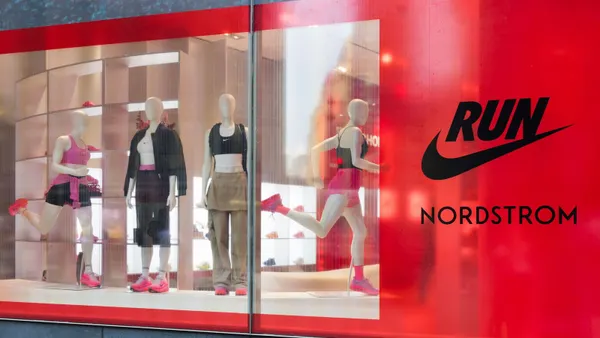Dive Brief:
- Target reported first-quarter sales increased 5.1% year over year to $17.4 billion as comparable sales grew 4.8%, according to a Wednesday press release.
- Comparable digital sales grew 42% in Q1, accounting for 2.1% growth in overall comps, Target said. Driving "well over half" of that digital sales growth were Target's same-day fulfillment services through order pickup, drive-up and Shipt, according to the company.
- The mass merchant's operating income rose 9% to $1.1 billion, and net income rose 10.8% to $795 million. Target said it was able to reduce production expenses through savings in technology and cost control throughout the company that offset wage increases.
Dive Insight:
Target joined Walmart this month in posting a solid quarter, as sales increased, profits remained healthy and digital sales expanded rapidly, with past investments paying off.
Like Walmart, Target has benefited from its store fleet, which is being used toward fulfillment of online orders and in-store pickup for online purchases. Target executives in a Tuesday analyst call noted that the retailer's customers prefer drive-up and pickup services that blend its store fleet with digital shopping, and those are also — happily for the company — its most profitable digital services.
Target's investment in its own brands are also paying off, executives said. Analysts took notice as well. "The continued roll-out of exclusive brands is driving both store and website traffic, and despite a brutal pricing environment due to the ongoing Walmart/Amazon market share battle, margins are holding steady," Moody's retail analyst Charlie O'Shea said in emailed comments.
Telsey Advisory Group analyst Joseph Feldman said in a client note that Target's moves to remodel its stores, invest in digital, deliver lower prices on everyday items and differentiate its merchandising with private brands "are resonating with consumers."
Feldman also noted that Target "stands to gain from ongoing industry consolidation." Target CEO Brian Cornell said on Wednesday's call that the company had been gaining market share at a time of heavy retail competition. "Winners are investing in their business," he said. "Those ceding share have not been able to invest and evolve to the new consumer environment."
The sentiment echoes those of other retail observers, including Moody's analysts who in a recent report said that retailers with healthy balance sheets have been able to take share from weaker, indebted competitors by holding their prices down and investing in their digital strategies. It amounts to a Darwinian struggle that the Walmarts, Targets and Amazons of the world are winning.
While much has been made of the growth of e-commerce in recent years, Neil Saunders, managing director of GlobalData Retail, also highlighted the importance of Target's store remodels in emailed comments. Saunders said refurbishments "provid[e] a much more pleasant and engaging shopping experience" that "have made them more compelling destinations leading to an increase in shopper traffic." And those consumers in stores are important, as they "make lots of impulse buys, which helps drive sales," he added.
Target executives expect the drives in comps, market share gains and operating income increases to continue through the year. O'Shea said that Target's performance could continue even through the "looming prospect" of new tariffs, which Walmart recently said could raise retail prices significantly. "[W]e expect Target to continue as one of the top performers in US retail," O'Shea said.













